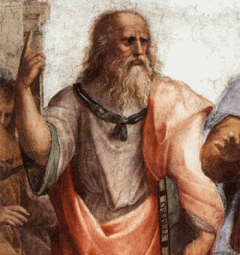
Greek
philosopher, mathematician
, student of Socrates
, writer of philosophical dialogues, and founder of the Academy
in Athens, the first institution of higher learning in the Western world
. Along with his mentor, Socrates
, and his student, Aristotle
, Plato helped to lay the foundations of Western philosophy
and science
. In the famous words of A.N. Whitehead
:
The safest general characterization of the European philosophical tradition is that it consists of a series of footnotes to Plato.
Rhetoric, it seems, is a producer of persuasion for belief, not for instruction in the matter of right and wrong ... And so the rhetorician's business is not to instruct a law court or a public meeting in matters of right and wrong, but only to make them believe.
![]()
Then the case is the same in all the other arts for the orator and his rhetoric; there is no need to know the truth of the actual matters, but one merely needs to have discovered some device of persuasion which will make one appear to those who do not know to know better than those who know.
![]()
The orators — and the despots — have the least power in their cities ... since they do nothing that they wish to do, practically speaking, though they do whatever they think to be best.
![]()
I shall argue that to seem to speak well of the gods to men is far easier than to speak well of men to men: for the inexperience and utter ignorance of his hearers about any subject is a great assistance to him who has to speak of it, and we know how ignorant we are concerning the gods.
![]()
All that is said by any of us can only be imitation and representation.
File:Versailles Demi-Lune Le Dieu Pan.jpg|144px|thumb|right|Oh dear Pan and all the other Gods of this place, grant that I may be beautiful inside.
![]()
Oh dear Pan and all the other Gods of this place, grant that I may be beautiful inside. Let all my external possessions be in friendly harmony with what is within. May I consider the wise man rich. As for gold, let me have as much as a moderate man could bear and carry with him.![]()
Friends have all things in common.![]()
The eyes which are the windows of the soul.
![]()
And the true order of going, or being led by another, to the things of love, is to begin from the beauties of earth and mount upwards for the sake of that other beauty, using these steps only, and from one going on to two, and from two to all fair forms to fair practices, and from fair practices to fair notions, until from fair notions he arrives at the notion of absolute beauty, and at last knows what the essence of beauty is.![]()

